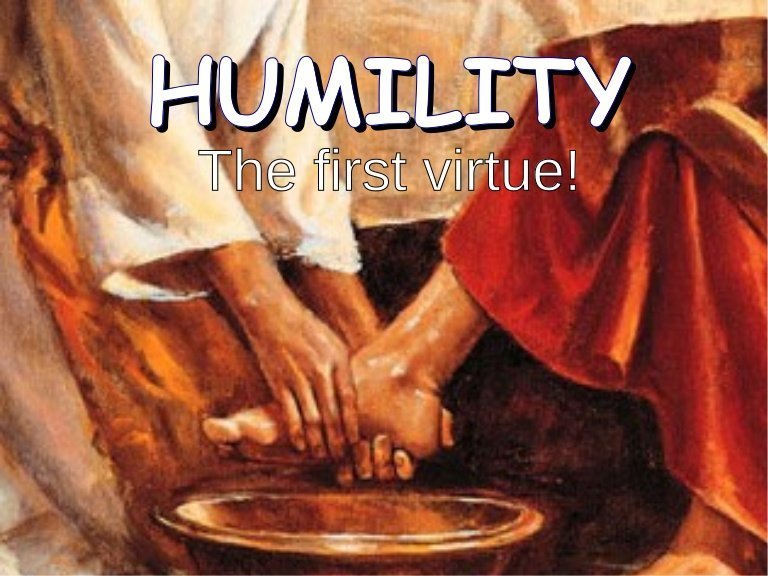

A dictionary definition of Humility is “a humble attitude toward others.”
What is Humility? Humility can help us become more confident and booming in our personal and professional lives. Humility can also help us gain inner peace and self-esteem.
Humility is a part of what psychologists call the “inferiority complex.” Successful people have an assurance about themselves that others can not help but notice. If our strength and talents humble us, it shows the world that we are not egotistical or boastful, just like everyone else. This Humility helps others see what we have to offer. And this makes us more desirable and endearing.
In a recent article on the front page of Self Magazine, Isabel De Los Rios suggested there are times when you should learn to keep your Humility.
Sometimes, personal weaknesses make it necessary to learn to be more humble. At other times, Humility demands that you don’t obsess over your strengths. When your mental muscles are in check, you can still display this virtue, allowing you to use your powers to the best of your ability. When your Humility is tested, remember to keep your strength intact and use your powers to learn from your failures.
I experienced many lows and very few highs during my career, and life experienced many lows and few thrills. During those low moments, I gained strength and perspective through humbleness and understood what Humility was. I learned to walk in that strength. When I allowed myself to be vulnerable, I understood that I had nothing to be ashamed of; and that humility could lead to success.
As a human, I can have low self-esteem, but I realized quickly I didn’t need to try to fake my way into believing in myself or being confident.
Instead, I would allow my Humility to speak for itself and draw me to myself where my true self was. As I grew in my career, it was understood that being confident and convincing were part of making money. But I didn’t let my shyness stop me from pursuing my dreams. I still believe in myself and am far less likely to be distracted by my insecurities.
It is the state of being humble in attitude—Dictionary definitions highlight humility as a low opinion of one’s self-worth and self-regard. Humility is an essential, or secondary, expression of proper inward or self-respect.
There is a difference between respecting others and having humility. People who have humbleness are respectful of themselves. They are not arrogant or selfish because they respect themselves. This allows for freedom and open-mindedness in their thinking. Respect comes from within; it cannot be achieved externally. A person with humble beliefs has inner peace.
In contrast, someone with false humility believes they are right without knowing or realizing they are wrong.
To be humble is not to have an inflated sense of self-importance; true humility is the opposite. Jesus was not arrogant or self-centered. To be humble is to have a proper understanding of self-worth.
True humility is not having excessive or unnecessary pride in your talents but rather humble confidence in your abilities. A feeling that you have arrived, that you are respected, and that your opinion matters.
Jesus was a humble person, or, more correctly, a meek person. Meekness refers to submitting to Christ for the sake of our relationship with God. Submission to Christ is life; submitting to God is the basis for salvation. Therefore, a humble person will also be saved.
It differs from humility, often seen today as an unwarranted imposition of shame on an individual, usually external. We see the contrast between humility and vanity through the example Jesus made when he was humble in his stature.
The grace of God is available to all humanity. If we are willing to humble ourselves and receive the grace of God upon our lives, we will be given all of the glory that is promised to those who do good. It is the fruit of the Word that humbleness brings; it is not something from the grapevine or luck of the dice.
True humility gives grace, which many people want in their lives.
https://youtu.be/qrFp7sax98w
Author W. Worthington Etch introduced the concept of character strength. I highly recommend his book to anyone who wants to know more about the mindset of genuinely humble people. One character that comes to mind in W.W. Etch’s book is Prideful Quaker. Here is what he says regarding this quote:
“Knowledge abounds in proportion to the humility of the soul, that covetous man may learn, though not shameless, to love God with all his heart, soul, mind, and strength, for there is no pleasure in the world to his neighbor.”
When people practice, they become better because they are not holding on to things they don’t need. They are not worried about what others think. People who have Humility in them do not worry about what will or what won’t happen. They welcome it as another part of being human. To get anywhere, you must learn to let go of certain things, such as fear, anger, sadness, and guilt.
By practicing Humility in every aspect of your life, you will find that you will be happier, calmer, and generally better off as a result. So start practicing Humility today by reading, studying, and attending a class where you can learn about this powerful concept!
People sometimes ask the question, “Why is humility important?”
Humility is a virtue that we can all practice and even benefit from in our lives. If we are not humble, we will never reach our full potential or accomplish what we want.
However, just being humble will not bring us anything. As soon as you remove yourself from the pedestal of high status, you place yourself lower than everyone else. When you remove yourself from the pedestal, you do not put yourself in a position of honor or pride, which is what humbleness truly is. It is placing yourself on a humble pedestal where you can be vulnerable and open to receiving blessings rather than seeking them.
It is stated somewhere this is necessary because we have all been allowed to choose what we will do with our time. We have also been given the power to choose what we will do with other people’s time.
By taking responsibility for our own life, we will then take responsibility for the lives of others.
I like Humility research because it gives you a healthy self-image by challenging the negative image of what a person should be. It shows you how to live a life full of gratitude and says true happiness begins with a humble heart and a healthy sense of self-worth.
Humility teaches you to appreciate what you already have rather than always searching for more, wanting more. When you first practice being humble, you may think it is essential. However, it should open some exciting topics andexciting once you get started. It will show you that many great things come from humility.
What is being humble about? Many people believe that being humble means a total lack of self-esteem. However, being humble means something different to everyone. Some people think being humble means being modest and living by the example set by our forefathers. The Bible calls it a “humble” character and says that one should humble themselves to inherit the kingdom of God.
He is humble means knowing that you belong to a particular person, a divine person. It means you have been given a specific role or authority, even a spiritual one.
That role is to obey and follow the lead of the Holy Spirit. Jesus consistently pointed out that he belongs to the Father, not only to his Disciples but also to the church or society. Being humble can be seen as having a particular internal potency, a divine inner power. That divine internal potency enables one to act amazingly and make one’s life extraordinary or straightforward.
So, it would seem that those who believe that being humble means a lack of self-esteem is flat out wrong. While it may be hard to live with pride, as people are told to “be humble,” the difficulty comes when people try to live with humility but do not submit to God.
As Jesus was raised from the dead, he continually rebelled against the high priest; however, he never refused to be humble. So, those trying to avoid humbleness are setting themselves up for failure.
Do humble people have strong character? The concept of having “surface” as something that one must earn or develop seems foreign to most of us, and we see it as something we are born with or develop over time.
While it is true that we all have solid inner selves that do the things that we do and feel the things we think, it is also true that we can all learn to be humble and start making good choices and firm decisions, even if those choices and decisions are not motivated by the need to become humble or because of some innate quality we have to be a certain way.
Being humble is your internal state of dignity that comes from your ability to humble yourself before others. It means accepting that you cannot do everything you want and there are things that you cannot control or influence ultimately.
However, the fact that you can do these things and still have grace for yourself does not make them less real or substantial. What it does mean is that you honor yourself and accept the fact that you have limitations. This fact is crucial because it allows you to look at situations objectively instead of a reaction that temporarily elevates your pride above what is truly important to you.
Humility starts with you first knowing and acknowledging who you are. This does not mean you live a self-imposed role that contradicts who you are or what you truly believe. Instead, it simply means that you begin to see and value yourself on a different plane than you do others.
Often we allow others to tell us what we should be, but we must find our place within our self-introspection. We must be humble in others because they will only humble us.
We also learn from humbleness that gentleness means taking responsibility. We know to take personal responsibility for all of our actions and feelings. In taking personal responsibility for ourselves, we begin to honor ourselves and become humble in our actions and emotions.
You will be very hard-pressed to find a person who does not possess some selfishness or pride in their character. Yet, this is precisely what most people try to do when they humble themselves in anything or anyone.
When you humble yourself in the Bible, you cannot help but humble others. This is because the Bible includes many exhortations to humble ourselves before God.
The most telling passage in the Bible regarding humility is found in Peter’s revelation, wherein God says that we must become as little children of God. This means that we must imitate the behavior of children of God in everything we do. When we humble ourselves before God, we immediately receive His blessings upon our obedience.

One of the greatest gifts we can receive when we humble ourselves is one with our brothers and sisters in spirit.
People who genuinely humble themselves are not greedy or malicious; they are not out to hurt or slander others. They are genuinely humbled by their lack of ability to stand up in front of others and speak what they believe to be the Truth regarding whatever they are concerned about.








